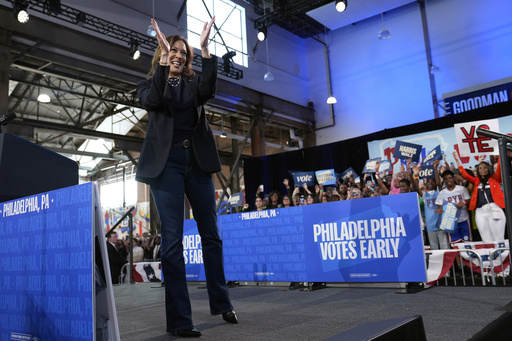
On Monday, Kamala Harris is set to underscore the significance of government financing for computer chip manufacturers, particularly how it can generate factory jobs in the pivotal state of Michigan. This announcement arrives shortly after Donald Trump expressed criticism of the bipartisan 2022 legislation designed to funnel this funding, preferring instead a strategy centered on imposing tariffs.
The Democratic Vice President’s agenda includes a visit to Saginaw County where she plans to tour a Hemlock Semiconductor plant. Recently, the Commerce Department disclosed that this company is poised to receive up to $325 million in direct aid to construct a new facility dedicated to producing hyper-pure polysilicon. This material serves as a fundamental component for various technologies, including electronics and solar panels. The establishment of the new factory is expected to generate 180 manufacturing jobs in Michigan.
Beyond her manufacturing focus on Monday, Harris has aimed to convey a range of messages to various voter demographics as the election approaches its conclusion. She has highlighted support for forgivable loans for small businesses to Black and Latino men, while also advocating for abortion rights to women during a rally in Texas with singer Beyoncé. Additionally, Harris has voiced her strong belief that Trump poses a fascist threat to democracy.
As of August, the CHIPS and Science Act has allocated $30 billion in support for a total of 23 projects across 15 states, projected to create 115,000 jobs in manufacturing and construction sectors, as reported by the Commerce Department. This financial support has attracted private investments, aiming to elevate the United States’ production capacity for the world’s most advanced computer chips to 30%, a sharp increase from the previous rate of 0% prior to the Biden-Harris administration.
Despite these developments, Trump criticized the federal initiative during a Friday interview for “The Joe Rogan Experience.” He claimed, “We put up billions of dollars for rich companies to come in and borrow the money and build chip companies here, and they’re not going to give us the good companies anyway.” The funds have indeed been channeled to key industry players such as Taiwan Semiconductor Manufacturing Co., Samsung, Micron, Intel, and GlobalFoundries for the establishment of U.S. factories.
Trump proposed that instead of government funding, he would increase tariffs on computer chips imported from abroad, arguing that heavy financial penalties would motivate companies to set up operations within the United States. “You tariff it so high that they will come and build their chips companies for nothing,” he stated.
However, many economists caution that such tariffs could exacerbate inflation issues. Elevated prices for computer chips might impact the costs of various products, including automobiles, kitchen appliances, smartphones, and other essentials. U.S. consumers felt these effects previously due to a global chip shortage that occurred during the pandemic.
The Census Bureau reported that in August, the annual expenditure on factory construction reached $238 billion, a significant rise from $74.8 billion observed in August 2020 during Trump’s presidency.
On Monday, Harris is also slated to visit a union training facility in Macomb County, Michigan, and will participate in a rally in Ann Arbor, which is home to the University of Michigan and a substantial number of college graduates, a growing Democratic voter base. She will be joined in Ann Arbor by her running mate, Minnesota Governor Tim Walz, alongside performances by singer-songwriter Maggie Rogers. During this critical phase of their campaign, they are organizing a series of combined rallies and concerts with the objective of encouraging both early voting and turnout on Election Day.
The campaign is optimistic that the involvement of performing artists will serve as “trusted voices” to help galvanize voter participation.
